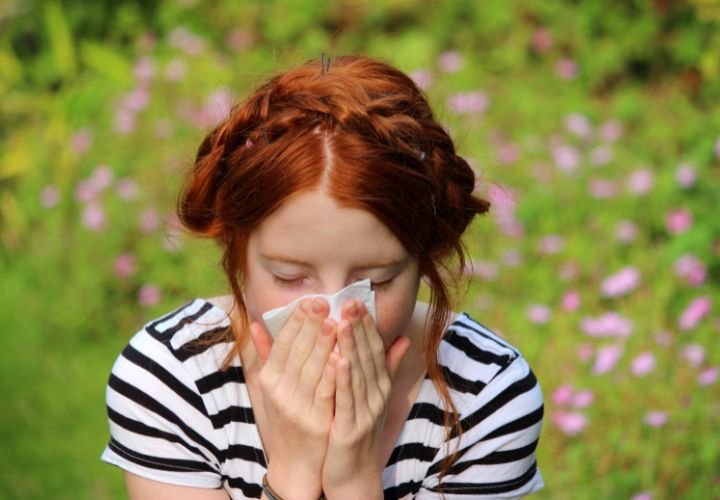A Nutritional Approach to Hay Fever: Taking Control of Your Summer
As the warmer months roll in, so does the dreaded hay fever season for many in Ireland. Hay fever, or allergic rhinitis, can turn sunny days into a sneezy, itchy-eyed ordeal for thousands. Contrary to its name, hay fever isn't just triggered by hay or dried grass—it stems from an abnormal immune response to pollens, tree grasses, house dust mites, and even animal fur. This immune overreaction prompts the release of histamine, leading to tissue inflammation and the uncomfortable symptoms that define hay fever including constant sneezing, watery eyes, a runny nose, and throat irritation.
The conventional approach often relies on antihistamines, steroids, and decongestants to suppress symptoms. While these can provide temporary relief, they don't address the root cause and can come with side effects. These medications work by dampening the immune response, which may also weaken the body's defences in the long run.
From a nutritional therapy stance, respiratory issues like hay fever are regarded as immune system disorders. Since a significant portion of our immune cells reside in the gut, dietary changes play a crucial role in managing these conditions alongside reducing exposure to allergens. Much of the newer research has demonstrated the role of our own microbiome in instigating and modulating our immune response to allergens and pathogens. This paves the way for a clearer understanding of the importance of supporting gut health and addressing the patient’s diet. The food we eat directly impacts our microbiome and is responsible for the nourishment and diversity of its species that reside within.
Adopting a plant-slant to your eating means that most of your food comes from plant sources. The diversity of fibre, nutrients and energy from plant-based ingredients ensures that the gut environment is perfect for the microbiome to thrive. Without getting into the nitty-gritty of identifying individual micro-organisms and their sub-species, we can be certain that a wholefood, mostly plant-based diet that is low in sugar, refined grains and junk food is the foundation of both a healthy gut and a flourishing microbiome.
Complementary to the plant-slant approach to meals is paying attention to the types of fats you consume. Steer clear of unhealthy fatty foods, cheap vegetable oils and partially hydrogenated fats found in ultra-processed foods. These are pro-inflammatory and while may not instigate hay fever, they can exacerbate the inflammatory response, which is the real driver of all the symptoms of hay fever. Instead, opt for anti-inflammatory fats such as olive oil and omega-3 fatty acids found in cold-water fish (mackerel, salmon, sardines), nuts (walnuts, almonds), and seeds (pumpkin, chia and flax).
Incorporate other colourful anti-inflammatory foods, which are rich in antioxidants like vitamins A, C, and E. These include berries (blackberries, strawberries), fruits (kiwi, mango), vegetables (carrots, spinach), and grains (brown rice, oats). Spices like ginger and turmeric are also potent allies due to their anti-inflammatory properties.
Supplements can be valuable additions to a hay fever management plan, offering an effective and sustainable support for the immune system and reducing inflammation. Here are some evidence-based supplements that can help manage hay fever symptoms:
Quercetin: Quercetin is a flavonoid with potent antioxidant and anti-inflammatory properties. It may help stabilize mast cells, which release histamine during allergic reactions. Studies suggest that quercetin can reduce symptoms like sneezing and nasal congestion associated with hay fever. It's commonly found in foods like onions, apples, and berries, but supplementation may be necessary for therapeutic effects.
Vitamin C: Vitamin C is a powerful antioxidant that can support the immune system and reduce histamine levels. Some studies suggest that vitamin C supplementation can decrease the severity of hay fever symptoms, particularly nasal congestion and sneezing.
Omega-3 Fatty Acids: Omega-3 fatty acids, found in fish oil supplements, have anti-inflammatory properties that can help reduce overall inflammation in the body, including allergic responses. They may also support immune function and help alleviate hay fever symptoms.
Probiotics: Probiotics are beneficial bacteria that support gut health and immune function. Research suggests that certain probiotic strains can modulate the immune system and reduce the severity of allergic reactions, including hay fever symptoms. Look for probiotic supplements containing strains like Lactobacillus rhamnosus and Bifidobacterium lactis.
Butterbur: Butterbur extract (from Petasites Hybridus) has been studied for its potential to relieve hay fever symptoms and migraines. It contains compounds that act as natural antihistamines and anti-inflammatory agents. Some clinical trials have shown that butterbur extract can reduce nasal symptoms like congestion and runny nose in hay fever sufferers. At the time of writing, I cannot confirm if you can get this as a supplement in Ireland. However, it is derived from the common Irish wildflower of the same name that typically grows abundantly in wetlands, by riverbanks and damp roadsides. Interestingly, it’s growing season runs from March to May, perfectly timed for the onset of Hay fever.
Stinging Nettle: Stinging nettle extract may have antihistamine and anti-inflammatory effects, which can help alleviate hay fever symptoms. Some studies suggest that stinging nettle supplements can improve nasal airflow and reduce sneezing and itching in people with allergic rhinitis.
Bromelain: Bromelain is an enzyme found in pineapple that has anti-inflammatory properties. It may help reduce nasal swelling and improve breathing in individuals with hay fever. Bromelain supplements are available and can be used as an adjunct to other treatments.
It is important to note that while these supplements show promise in managing hay fever symptoms, individual responses can vary. Always consult with a healthcare professional before starting any new supplement regimen, especially if you have underlying health conditions or are taking medications.
It's time we heed Mother Nature's advice and embrace these nutritional strategies to reclaim our summers—symptom-free and full of vitality. So, take charge, do what you can to help yourselves and enjoy the season with a nourished body and a well-behaved immune system!

